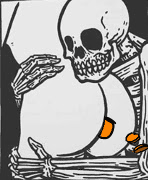|
Is there any program that points out when you start a sentence with "I" three times in a row? Or any similar trip up like that that can break the flow of a piece?
|
|
|
|

|
| # ? May 22, 2024 08:31 |
|
Exmond posted:Is there any program that points out when you start a sentence with "I" three times in a row? Or any similar trip up like that that can break the flow of a piece? I've had good luck with Hemingway - not for that specific problem, but for finding sentences that are too complicated, rogue adverbs (and usually that means I've usually used the word usually too much - which does break the flow).
|
|
|
|
steeltoedsneakers posted:I've had good luck with Hemingway - not for that specific problem, but for finding sentences that are too complicated, rogue adverbs (and usually that means I've usually used the word usually too much - which does break the flow).
|
|
|
|
Whalley posted:Hemingway is a good tool for the basics of finding Weird poo poo in your writing, but be aware that it's super prescriptive - it doesn't give a poo poo why you're writing in a certain manner, only that you're Not Writing Simply Like Hemingway Would Have. I like running chapters through it, but I'd say I only fix one in every three things it calls out. Yeah. It seems like an overreaction to shoot for no adverbs or passive voice. They were definitely overused before Hemingway started, which is why his style was refreshing. But taking them out completely would be like saying movies should no longer have the colors orange or teal because they were overused in the late 2000s/early 2010s.
|
|
|
|
I think the best program to help you catch poo poo like that is some kind of dictation software that can read your story out loud to you.
|
|
|
|
I guess all those writing books I bought weren't a complete waste of money. All the advice they had about avoiding unintentional repetition, unnecessary adverbs, and use of the passive voice must have sunk in so that I catch that stuff immediately.
|
|
|
|
What do you all do about writer's block? I've had it bad, for months now. I know the causes and solutions of just not being able to write are almost always pretty personal, and often as much a matter of discipline as anything, but I'm just not sure what to try anymore. I've been making myself at least sit down at my computer and write something every day, and I've been managing that, but not actually producing anything with much success. I've entered Thunderdome twice in the last few weeks and haven't managed to even get a story started, really.
|
|
|
|
|
MockingQuantum posted:What do you all do about writer's block? I've had it bad, for months now. I know the causes and solutions of just not being able to write are almost always pretty personal, and often as much a matter of discipline as anything, but I'm just not sure what to try anymore. I've been making myself at least sit down at my computer and write something every day, and I've been managing that, but not actually producing anything with much success. I've entered Thunderdome twice in the last few weeks and haven't managed to even get a story started, really. The bottom line is, if you like to write (but aren't a professional with professional deadlines), there are periods where you just won't generate any output. Maybe it's a week, maybe it's a month—I'm coming off of almost 4 months of little to no output because my brain sat its rear end down like a petulant puppy refusing to walk on its leash. For most of us, these periods of non-output will come and go in a cycle of months or years. I've found, however, that the brain is generally creating stories even if we're not writing them down; sometimes that needs to happen in the background of your mind for quite a while before you're seized by that spark that eventually actualizes into a story. This might not work for you, but I find a little reverse psychology can help. I tell myself that I am not, under any circumstances, going to write. I then fill my time with things that allow my mind to wander—lots of long walks, drawing, listening to music on the train/bus. Almost invariably, stories will arise and dissipate in my head as I let my mind drift, but I don't put any pressure on them or try to develop them in anyway. I just let the creative part of my brain have fun without expectation. After a while, I'm usually struck by an idea that refuses to dissipate, who needs to be expressed on the page, and then it's second nature to start writing it down. The "writing" part of writing ceases to be a barrier. ymmv
|
|
|
|
Yep, getting myself inspired is a pretty great writer's block cure. Consuming other media (or experiences) that make me excited about storytelling is a pretty great way to get myself putting something I'm excited about on the page. I'll collect ephemera, watch movies, read books, or go to events that are in the same realm as the thing I want to make, which inevitably makes me yearn to channel all that into my own work.
|
|
|
|
Also consider the environment you're putting yourself in when you write, and whether that coincides with things that, for you, are the antithesis of casual writing. For example, my work has been stressful enough for the last few months to recently start giving me tension headaches, and my job involves sitting at a computer all day and writing letters or documentation or plans or otherwise thinking very hard about words. This has made my brain utterly shut down when I open up a blank Google document to try writing something I'm passionate about, or be daunted by editing something I've already written. It's incredibly frustrating and even my limited time off hasn't been enough to get rid of that intimidation. Recently, though, I was transcribing something I'd already written in a notebook for preservation purposes, and while there wasn't anything new going on, it was satisfying and relaxing. I feel like writing by hand will help me out a lot, though I haven't had space to really try that out yet. I definitely second the idea of taking time to actively not think that you need to write, and maybe every so often in the meantime, consider your current writing environment and how that lines up with other things in your life.
|
|
|
|
MockingQuantum posted:What do you all do about writer's block? I've had it bad, for months now. I know the causes and solutions of just not being able to write are almost always pretty personal, and often as much a matter of discipline as anything, but I'm just not sure what to try anymore. I've been making myself at least sit down at my computer and write something every day, and I've been managing that, but not actually producing anything with much success. I've entered Thunderdome twice in the last few weeks and haven't managed to even get a story started, really. The kind of writer's block which I have is not usually of the "staring at a blank page with no idea where to begin" variety. Mine is more like I start to write a scene and then I get stuck, not sure where to go from there, or not sure how to put the idea I have in mind into words. I am starting to recognize that it doesn't mean there's something wrong with me, but it's a sign that there's something wrong with the scene itself which my subconscious doesn't like. Maybe I don't like how a character is reacting, maybe there's an implausibility in the scene, maybe my main character isn't being proactive enough, maybe the scene is missing part of the Goal/Conflict/Setback structure, who knows. The bottom line for me is that if I'm stuck, there's usually something wrong with the scene. To solve it, I need to think about what the scene needs to accomplish, what is missing, and see if the scene accomplishing something which I DON'T want (a character coming off as too unsympathetic or obnoxious, or a villain being too obviously villainous instead of more benevolent and subtle). quote:The kind of writer's block which I have is not usually of the "staring at a blank page with no idea where to begin" variety. EDIT: Well, that's not exactly true. Sometimes I think up some interesting or amusing concepts, but without a solid story to tie them into, I don't know where to go after that first scene. Stabbey_the_Clown fucked around with this message at 02:43 on Jul 16, 2019 |
|
|
|
Sitting Here posted:The bottom line is, if you like to write (but aren't a professional with professional deadlines), there are periods where you just won't generate any output. Maybe it's a week, maybe it's a month—I'm coming off of almost 4 months of little to no output because my brain sat its rear end down like a petulant puppy refusing to walk on its leash. For most of us, these periods of non-output will come and go in a cycle of months or years. I've found, however, that the brain is generally creating stories even if we're not writing them down; sometimes that needs to happen in the background of your mind for quite a while before you're seized by that spark that eventually actualizes into a story. This is me as well
|
|
|
|
Stabbey_the_Clown posted:The kind of writer's block which I have is not usually of the "staring at a blank page with no idea where to begin" variety. Mine is more like I start to write a scene and then I get stuck, not sure where to go from there, or not sure how to put the idea I have in mind into words. I am starting to recognize that not that there's something wrong with me, but as a sign that there's something wrong with the scene itself which my subconscious doesn't like. I recently listened to the Start With This podcast and the very first episode talks about how not everyone (in fact, probably no one) sits down and vomits out a novel or a work of art. They talk about how it's okay to sit down and write a backstory, or a little bit of a scene that won't go anywhere. Call it a character sketch if you will. If a scene isn't working for you, then write something else. Write about what the characters had for breakfast, or something that's important from their childhood, or what a different character thinks about them. I agree though If you are stuck on a scene, there's something you don't like about it. There are two paths. 1) Write it anyway and hate it. You can always go back and catch it in revision. 2) Write AND THEN THEY KISSED AND MADE UP. LATER, THE VAMPIRES WERE ATTACKING and then go on to something you're not stuck on. Again, you can catch it in revision.
|
|
|
|
Squidtentacle posted:Also consider the environment you're putting yourself in when you write, and whether that coincides with things that, for you, are the antithesis of casual writing. Hell, on an easier and far more literal level, I broke a recent semi block by changing my environment... by taking my laptop into a room I don't normally use for creativity. Sometimes, creating a routine gives you the opportunity to like, break it? in a way that lets you unlock secret eldritch writing magicks?
|
|
|
|
That one's as old as time but yeah it works well 
|
|
|
|
Whalley posted:Hell, on an easier and far more literal level, I broke a recent semi block by changing my environment... by taking my laptop into a room I don't normally use for creativity. Sometimes, creating a routine gives you the opportunity to like, break it? in a way that lets you unlock secret eldritch writing magicks? Maya Angelou would rent a hotel room to write in. Agatha Christie wrote in the bathtub. Truman Capote wrote lying down in bed. George Bernard Shaw wrote in a backyard garden shed with a rotating mechanism so he could turn it to face the sun all day long. Writers are weird, is what I'm saying.
|
|
|
|
And I wish I had an egg chair so when I turn my back to everyone it’s means, I am writing dammit, and if anyone disturbs me I can turn and say, “How dare you disturb me in the writing pod.” 
Stuporstar fucked around with this message at 18:36 on Jul 16, 2019 |
|
|
|
Thanks for all the ideas, friends. I know my writer's block is probably 90% depression/anxiety and so dealing with that is probably the main focus, but I can at least try some of these suggestions and see if it eases the way at all. Especially when I'm dealing with depression I can easily get in a trap where I push myself too hard to create, so the wise course would be to just relax and be nice to myself, but then I feel like I'll never get anything done if I don't push a little. Still haven't figured out that balance.
|
|
|
|
|
I stopped being a night owl two years ago so I that could start walking up at five to write in the morning with no distractions. It's incredible. But it also means that I'm a total bummer on weeknights. And my now-ex despised it and thought I was crazy.
|
|
|
|
Mirage posted:Maya Angelou would rent a hotel room to write in. Agatha Christie wrote in the bathtub. Truman Capote wrote lying down in bed. George Bernard Shaw wrote in a backyard garden shed with a rotating mechanism so he could turn it to face the sun all day long. What I'm getting out of this list is that writers are able to write when they're relaxed. Bathtubs are nice as heck, so are beds. Shaw enjoyed some sunshine, good for him. Vitamin D production is important yo! Being relaxed but still alert seems to be the key here.
|
|
|
|
feedmyleg posted:I stopped being a night owl two years ago so I that could start walking up at five to write in the morning with no distractions. It's incredible. Yeah it’s bizarre how much more productive and creative I am early in the morning. I do most of my writing and translating at 6 before I get ready for work.
|
|
|
|
feedmyleg posted:I stopped being a night owl two years ago so I that could start walking up at five to write in the morning with no distractions. It's incredible. I used to scoff at the “if you’re a night owl, you can be at your creative best if you get up and work on your stuff before breakfast” but once I actually tried it, it really does work. Since I stopped letting myself stay up late, getting up still half asleep and writing (before the internal editor has a chance to wake up) turns into some of my best writing days.
|
|
|
|
Stuporstar posted:I used to scoff at the “if you’re a night owl, you can be at your creative best if you get up and work on your stuff before breakfast” but once I actually tried it, it really does work. Since I stopped letting myself stay up late, getting up still half asleep and writing (before the internal editor has a chance to wake up) turns into some of my best writing days. That stands to reason. There've been studies done showing people are more creative right after they wake up. As for me, I don't get writer's block, but I write so slowly that I still probably have less long-term output than someone who gets it frequently. I do sometimes have "knots" in a story where I can't figure out how to have the thing happen that needs to happen, but I'm pretty sure that's a different phenomenon.
|
|
|
|
I've written the majority of my thunderdome stories between 7 and 8 a.m. The rest were weekdays in the mid afternoon when I should have been working.
|
|
|
|
Any advice for getting better at revising? Once I have something written down I always find it hard to revise because it's like a unit of inspiration that I'm no longer sure I fully understand later.
|
|
|
|
Its Coke posted:Any advice for getting better at revising? Once I have something written down I always find it hard to revise because it's like a unit of inspiration that I'm no longer sure I fully understand later. Write it again. By this, I mean open up two documents, one on either side, and type the whole thing out again. As you're reading through it, you're going to find stuff you don't like. Fix it as you're rewriting it. Fill in what's missing in your understanding, cut out the parts that are boring, and revise stuff that doesn't quite make sense into something that does. I usually do this for works that I know need a lot of heavy revision. Sometimes, I'll even do parts completely differently, but I'll still have the old version open to refer to, in case there's anything good I want to steal from it. In stuff that doesn't need as much editing, I'll do a similar technique but on the paragraph level--I'll just write a new version of the paragraph above the old one, and delete the old one when I'm done.
|
|
|
|
Its Coke posted:Any advice for getting better at revising? Once I have something written down I always find it hard to revise because it's like a unit of inspiration that I'm no longer sure I fully understand later. How long are the pieces you are rewriting? It might be useful to write down the main idea, or the central theme down. As Djeser and the OP say, write more.
|
|
|
|
Its Coke posted:Any advice for getting better at revising? Once I have something written down I always find it hard to revise because it's like a unit of inspiration that I'm no longer sure I fully understand later. I've been keeping a book with me to write down ideas and inspirations I get for certain scenes, or revisions/alterations to scenes. This helps refine my thought process and by writing it down, it sticks in my head better. It's kind of like pre-revising, because a lot of the time, just writing down the ideas leads me to spot issues in the scene before I start fleshing it out. And obviously, a written record will be something I can refer back to later if I don't know what I was going for in the first place. Djeser posted:Write it again. By this, I mean open up two documents, one on either side, and type the whole thing out again. As you're reading through it, you're going to find stuff you don't like. Fix it as you're rewriting it. Fill in what's missing in your understanding, cut out the parts that are boring, and revise stuff that doesn't quite make sense into something that does. This is basically my standard M.O.. Scrivener is great for organizing all your old ideas and having them on the screen at the same time for quick theft. The old adage "no plan survives contact with the enemy" is just as true for writing. In this case, "contact with the enemy" comes when you take the rough idea you have in your head for what you want to happen, and convert it into a scene. Just about every scene I've written, I haven't reached the end of before the process of writing the scene has highlighted something I don't like. Stabbey_the_Clown fucked around with this message at 01:59 on Jul 24, 2019 |
|
|
|
Its Coke posted:Any advice for getting better at revising? Once I have something written down I always find it hard to revise because it's like a unit of inspiration that I'm no longer sure I fully understand later.
|
|
|
|
Stabbey_the_Clown posted:I've been keeping a book with me to write down ideas and inspirations I get for certain scenes, or revisions/alterations to scenes. This helps refine my thought process and by writing it down, it sticks in my head better. It's kind of like pre-revising, because a lot of the time, just writing down the ideas leads me to spot issues in the scene before I start fleshing it out. And obviously, a written record will be something I can refer back to later if I don't know what I was going for in the first place. Scrivener is fantastic. I bought it back in high school and only now appreciate its value for big projects. I've still got to get all my thoughts in the file proper, since some of them are scattered across old chat messages and servers. But as soon as I've got them in, boom, I can consult them without looking for that file or chat. And the folders and subfolders are a blessing for me--I've got folders for research, machinery/lore, settings, characters, the script, and unsorted junk. And folders within those folders. It's $45, but that $45 goes a long way.
|
|
|
|
Android app when
|
|
|
|
Its Coke posted:Any advice for getting better at revising? Once I have something written down I always find it hard to revise because it's like a unit of inspiration that I'm no longer sure I fully understand later. Everyone has their own way of doing it. Personally I like to print out the rough draft and scribble all over it with a red pen, because I'm old and that's how it worked in typewriter times. Other revision advice I've seen: read it aloud (to yourself), retype it and change as you go, or, most radical, re-tell the whole story from square one, without referring to your first draft at all. This last one takes the most time (so I wouldn't really suggest doing it for, say, an entire 120,000 word novel) but also can help you really polish up the good bits of your story, since you already know how it went the first time. Then you can compare the two drafts and precipitate out a third draft made of the best parts of the other two. Then there's the ultimate advice: kill your babies. Find what you think is your most scintillating passage, your best description, your most clever turn of phrase, then throw it away and rewrite it. Usually you'll discover that the result flows better. Save the showstoppers for when the show really needs stopping.
|
|
|
|
Mirage posted:Then there's the ultimate advice: kill your babies. Find what you think is your most scintillating passage, your best description, your most clever turn of phrase, then throw it away and rewrite it. Usually you'll discover that the result flows better. Save the showstoppers for when the show really needs stopping.
|
|
|
|
Whalley posted:I hate that advice so much. I'd rather kill them by making them not so special after editing the other stuff which reads kinda lovely than get rid of the bits I think of as high points. Once I've made them not so special, then I can approach them more objectively, but I'd rather have a well written whole before getting rid of my high points than starting out by making the peaks and valleys of quality further apart. The way I’ve always taken that advice is that objectivity about your own work is impossible, so it’s highly likely that the aspects you like the most aren’t as good as you think they are, and might be hurting your overall story.
|
|
|
|
feedmyleg posted:Android app when When hell freezes over 
|
|
|
|
No, it's fine, I love copying and pasting my morning's work into a Google Doc to write on the train, then transferring it back to Scrivener and reformatting it the next morning. Every morning. Forever.
|
|
|
|
feedmyleg posted:No, it's fine, I love copying and pasting my morning's work into a Google Doc to write on the train, then transferring it back to Scrivener and reformatting it the next morning. Every morning. Forever. My personal favorite is Google Keep. I like to have all of my spur-of-the-moment notes, to-do lists, phone numbers, and groceries in one place. It's messy and disgusting.
|
|
|
|
feedmyleg posted:No, it's fine, I love copying and pasting my morning's work into a Google Doc to write on the train, then transferring it back to Scrivener and reformatting it the next morning. Every morning. Forever. Oh look at this guy, too fancy to just text themselves what they're writing. Yeah, sure, like 1/5th gets lost to the void, but it's really quite convenient.
|
|
|
|
Fashionable Jorts posted:Oh look at this guy, too fancy to just text themselves what they're writing. Yeah, sure, like 1/5th gets lost to the void, but it's really quite convenient. Me, I write my story notes by hand, photograph them with my cellular phone, email them to my other email address that I don't know how to log into from my phone, spend ten minutes figuring out how to log into my email with the wrong password, download the photos, and type my notes from them into Scrivener. It's nothing fancy, but it's honest work.
|
|
|
|

|
| # ? May 22, 2024 08:31 |
|
Karenina posted:My personal favorite is Google Keep. I like to have all of my spur-of-the-moment notes, to-do lists, phone numbers, and groceries in one place. It's messy and disgusting. I do this too, it's nasty
|
|
|




























